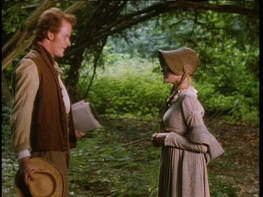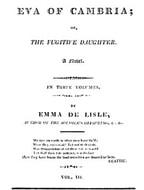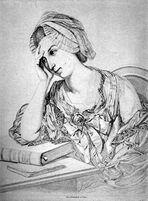| This blog explores social attitudes in Jane Austen's time, discusses her novels, reviews forgotten 18th century novels, and throws some occasional shade at the modern academy. The introductory post is here. My "six simple questions for academics" post is here. |
 Alistair Petrie and Samantha Morton as Harriet Smith and Robert Martin in the 1996 Emma
Alistair Petrie and Samantha Morton as Harriet Smith and Robert Martin in the 1996 Emma There's a bit of subtle humour too, because surely Emma is asking about serious reading--politics and philosophy and history--but Harriet thinks only of novels and the Elegant Extracts (a sort of Readers Digest Condensed Books of the day). She mentions two potboilers: "He never read The Romance of the Forest, nor The Children of the Abbey. He had never heard of such books before I mentioned them, but he is determined to get them now as soon as ever he can.”
We never learn if Robert Martin ever get a copy of Regina Maria Roche’s lengthy gothic romance novel, The Children of the Abbey, but it was a best-seller. A synopsis published one hundred years after its publication, describes it thus: "The motherless Amanda is the heroine; and she encounters all the vicissitudes befitting the heroine of the three-volume novel. These include the necessity of living under an assumed name, of becoming the innocent victim of slander, of losing a will [that is, the will hidden from her by her evil stepmother], refusing the hands of dukes and earls, and finally, with her brother, overcoming her enemies, and living happy in the highest society forever after. The six hundred pages, with the high-flown gallantry, the emotional excesses, and the reasonless catastrophes of the eighteenth-century novel, fainting heroines, lovelorn heroes, oppressed innocence and abortive schemes of black-hearted villainy, form a fitting accompaniment to the powdered hair, muslin gowns, stage-coaches, postilions, and other picturesque accessories.”
It’s a long book with a lot of twists and turns, so I'll stick to the highlights and some recurring themes and tropes. The villains "are completely depraved and infamous, hardly a resemblance of humanity left in them," to use Jane Austen's words, and the heroine sheds a lot of tears along the way...







 RSS Feed
RSS Feed